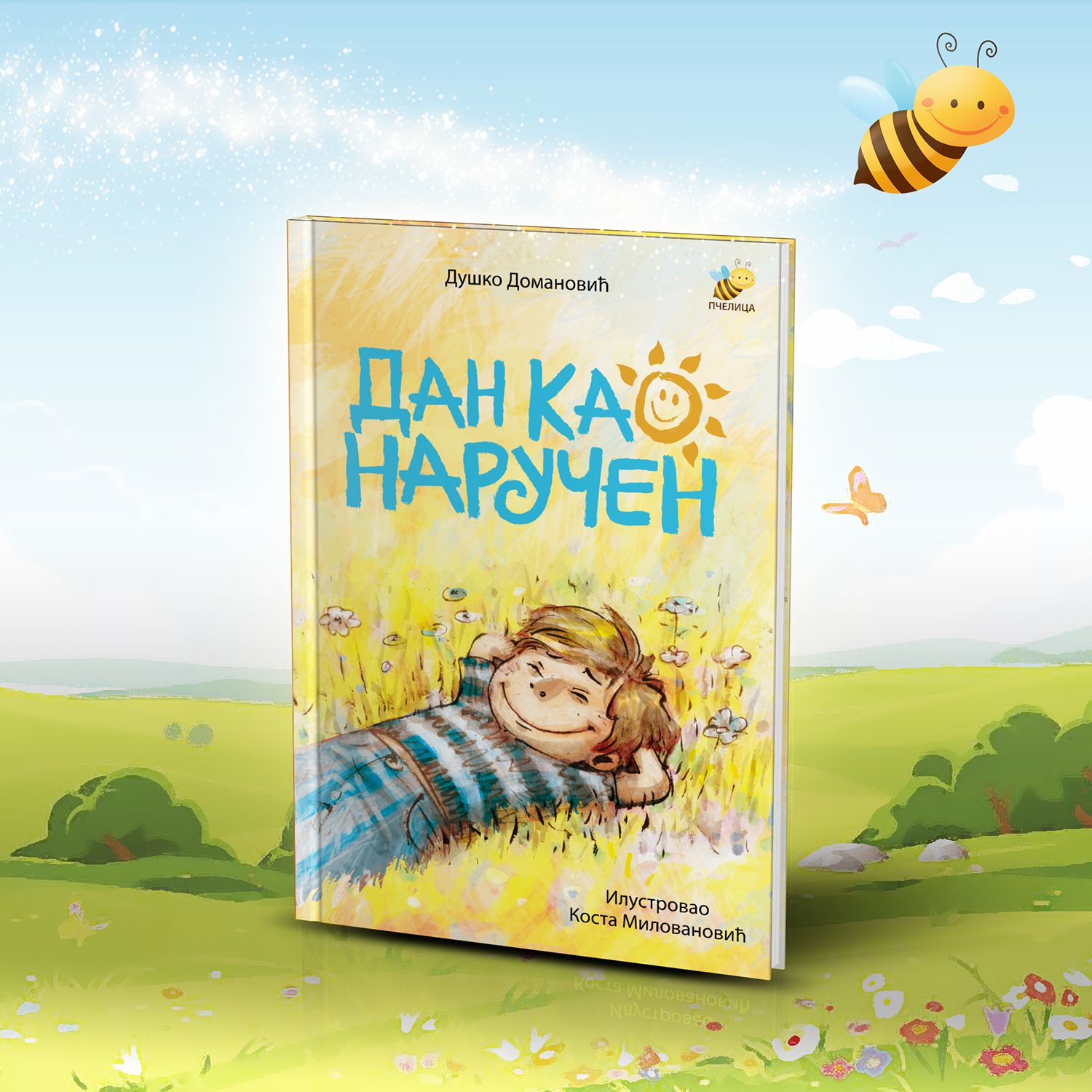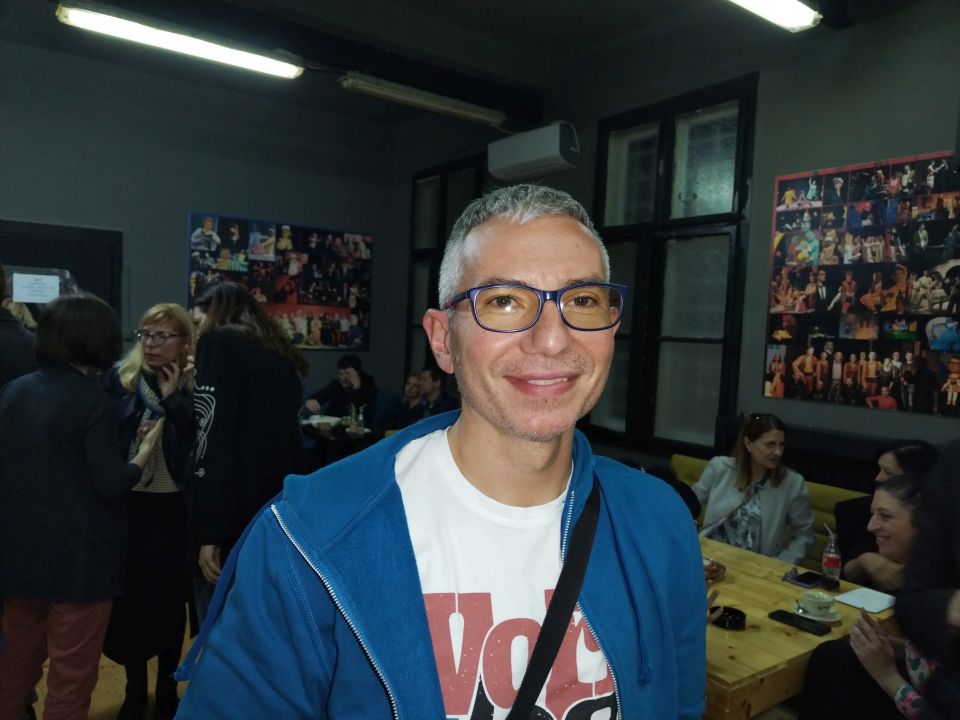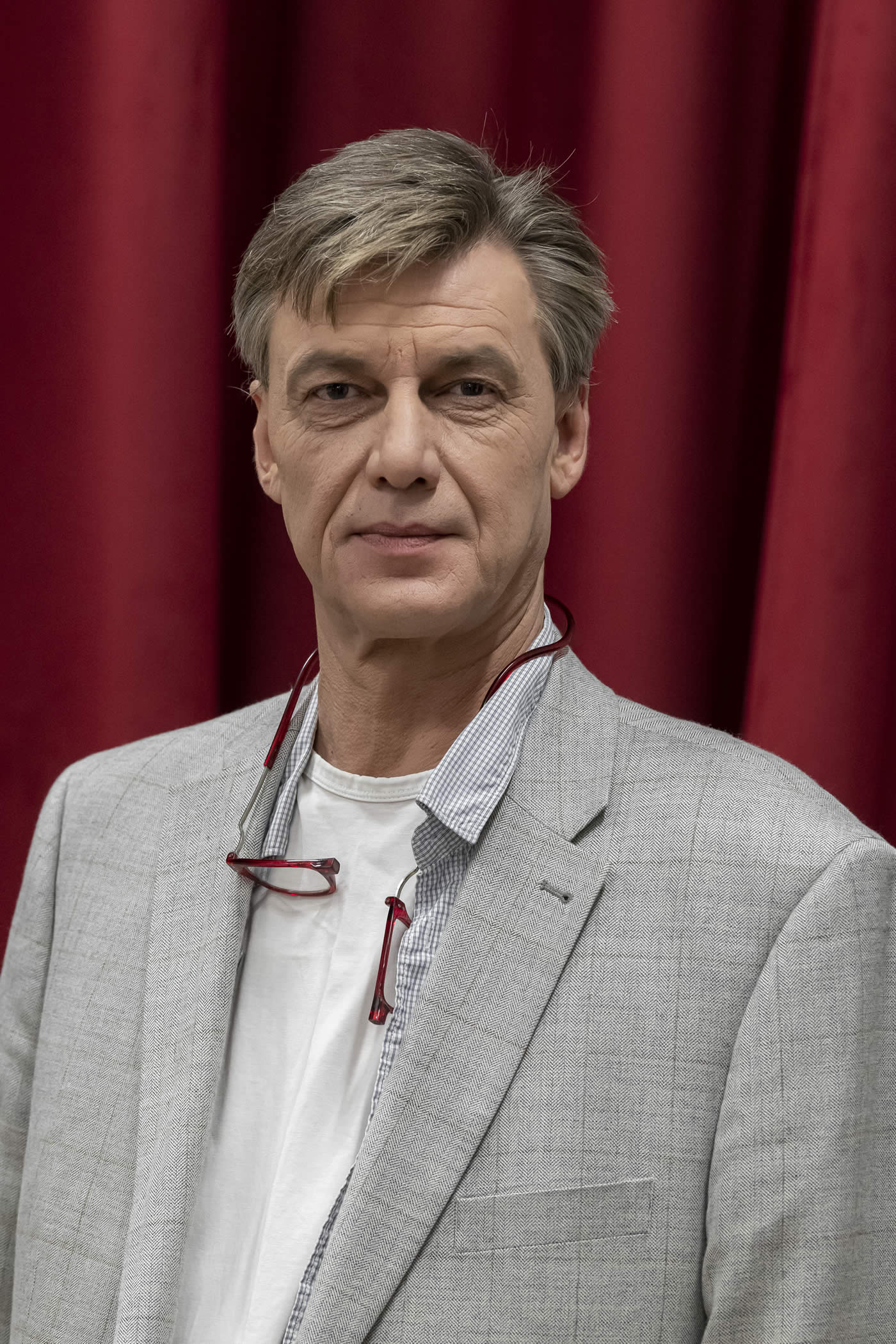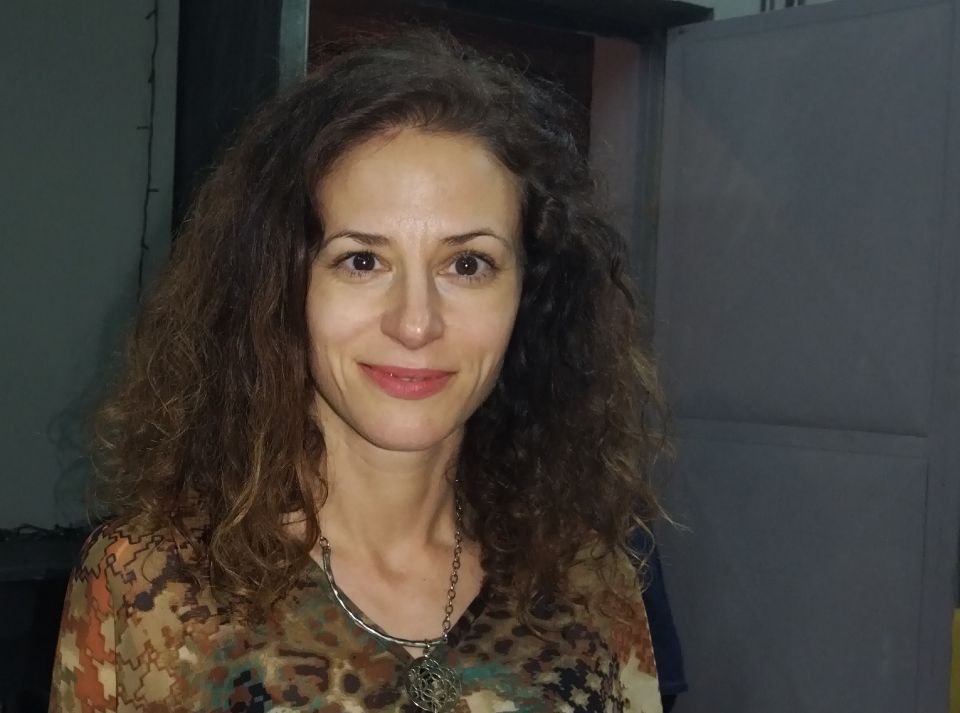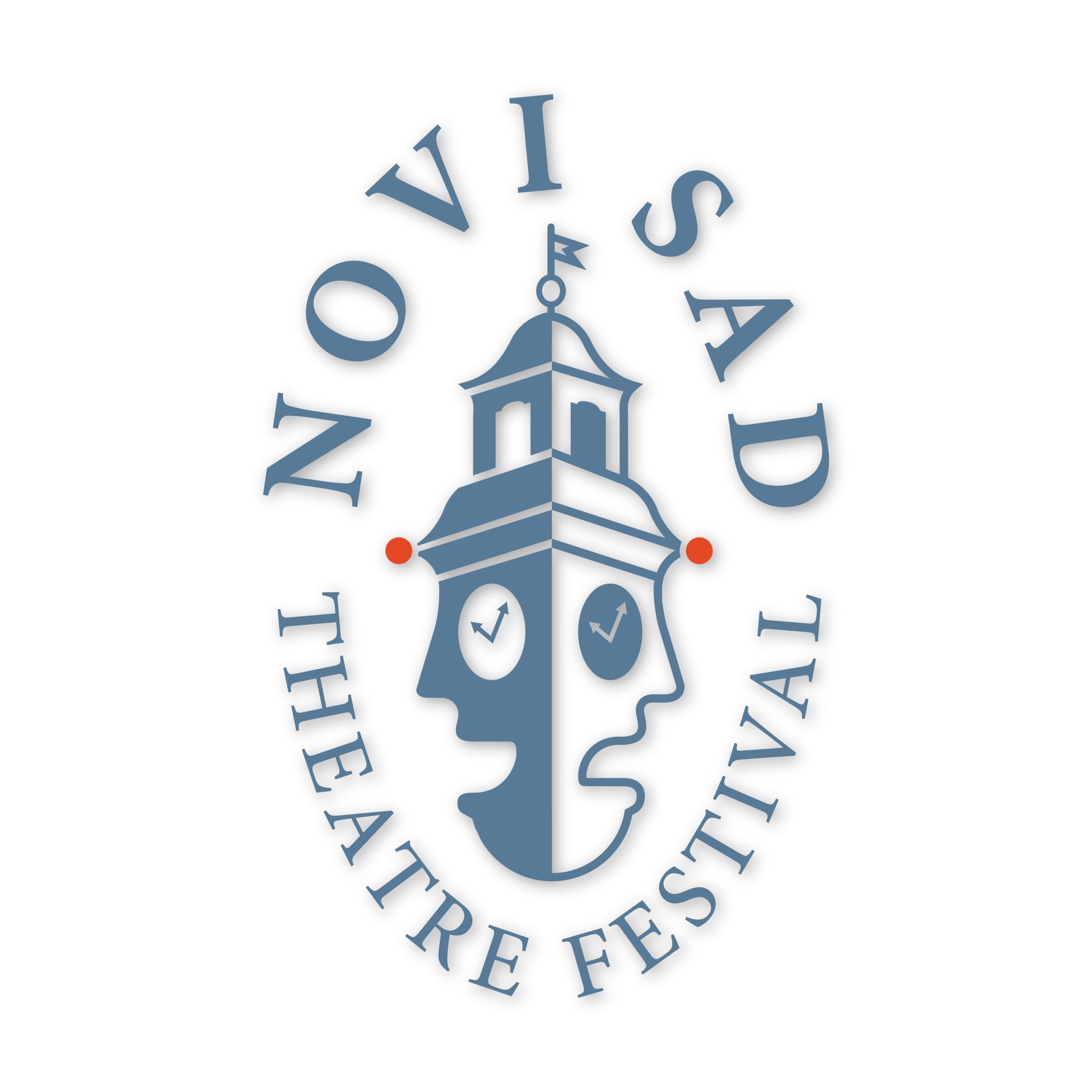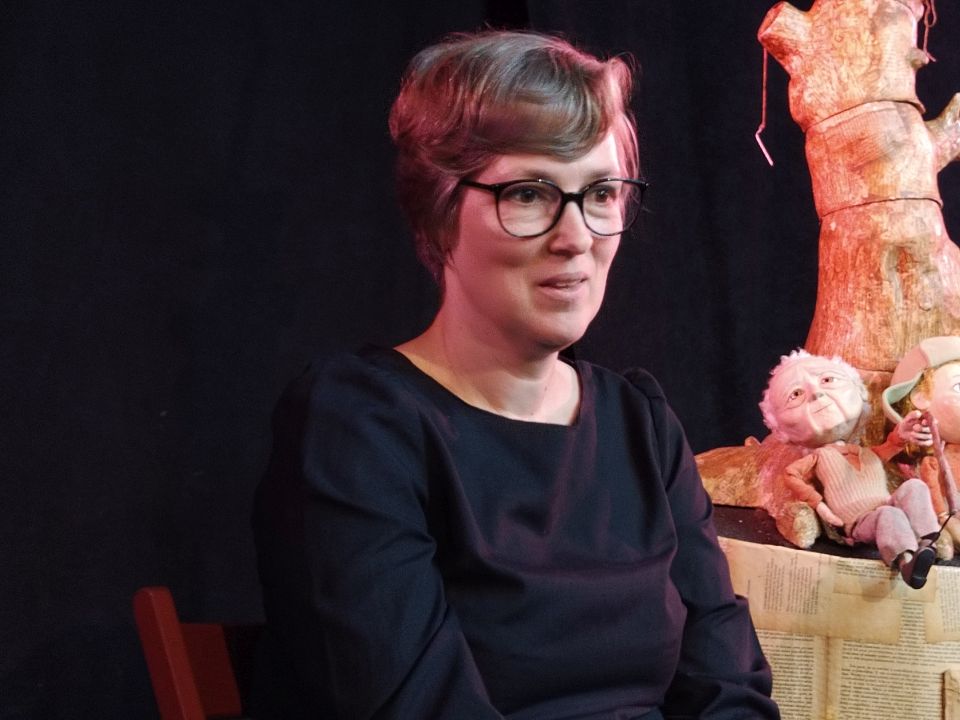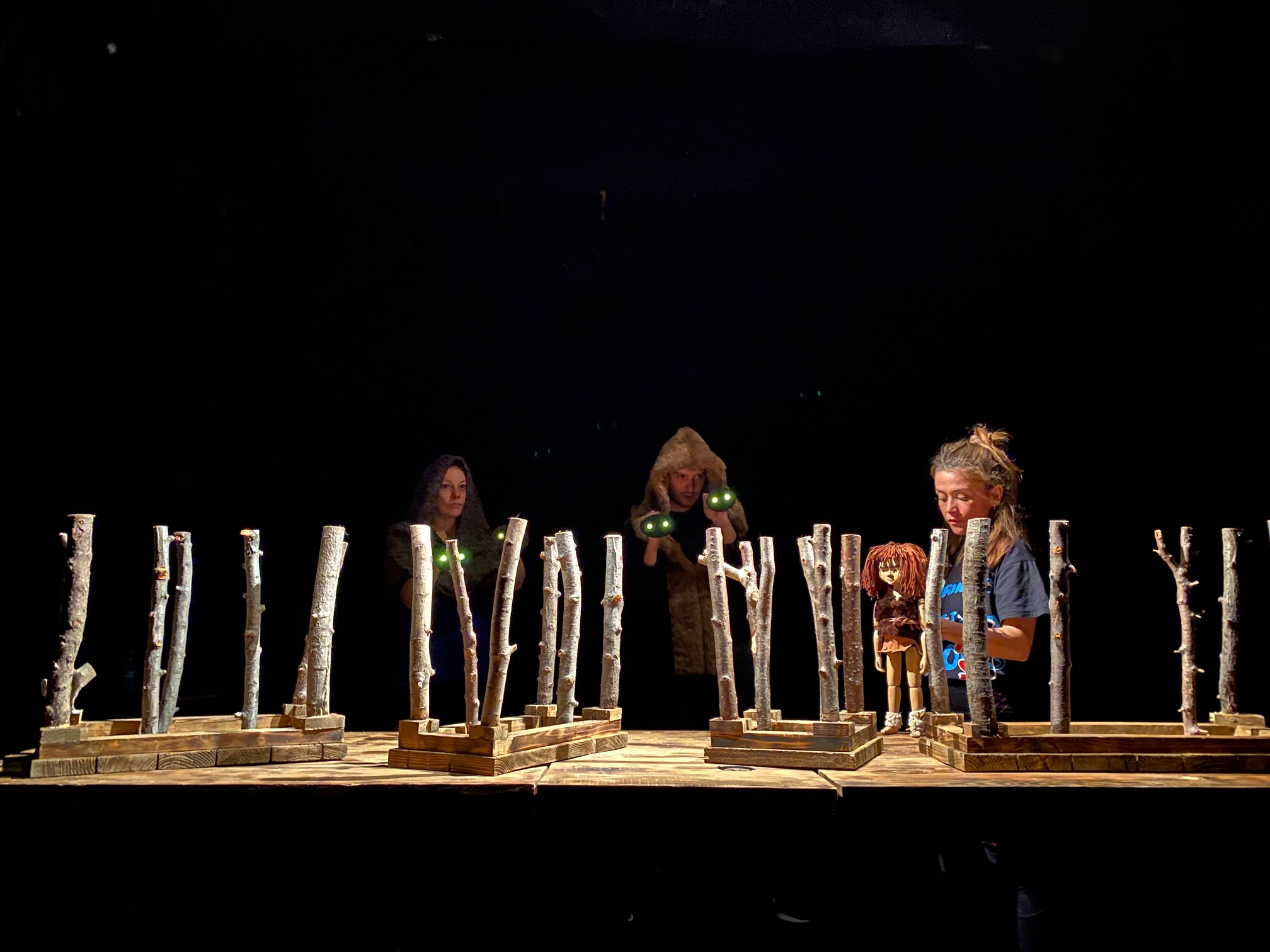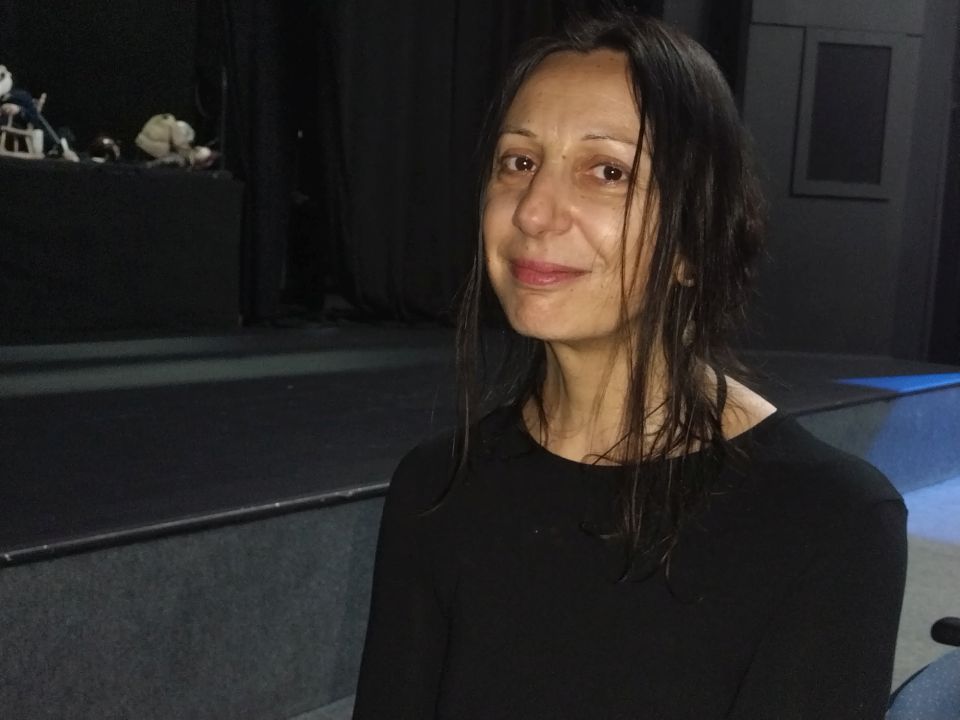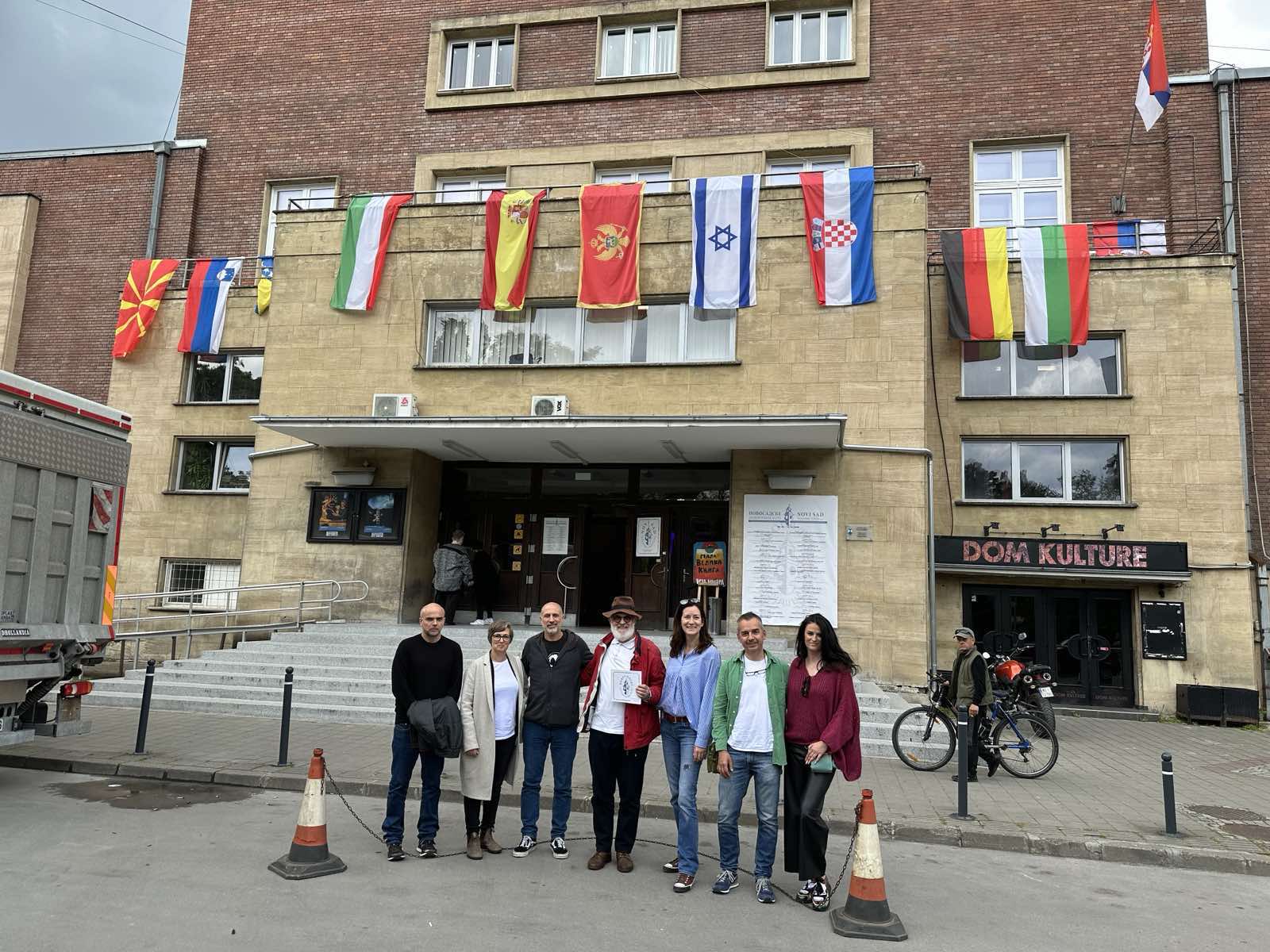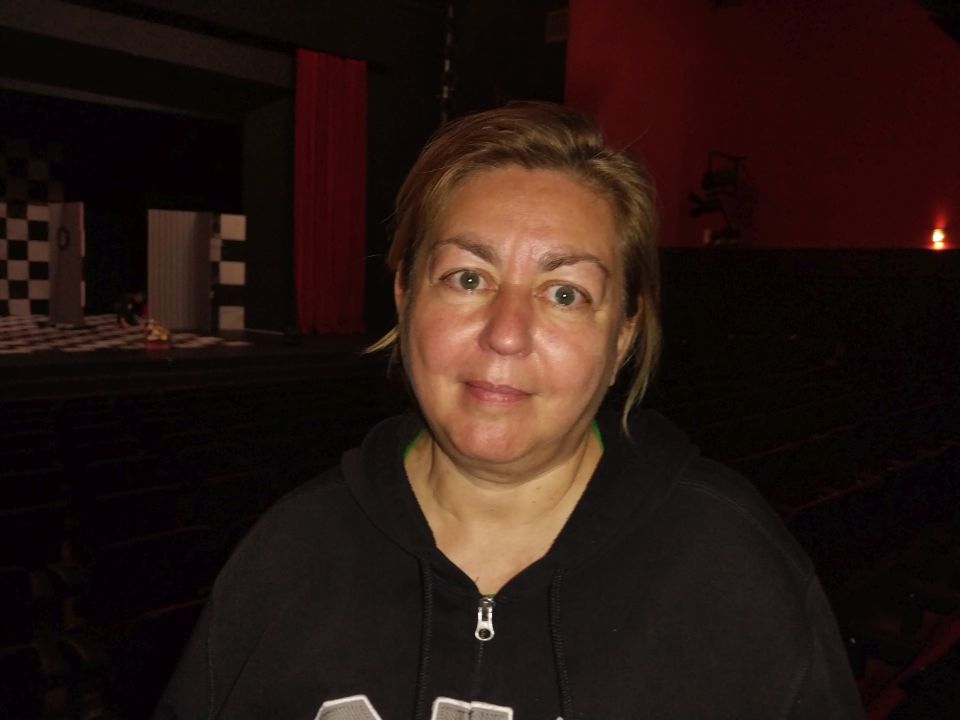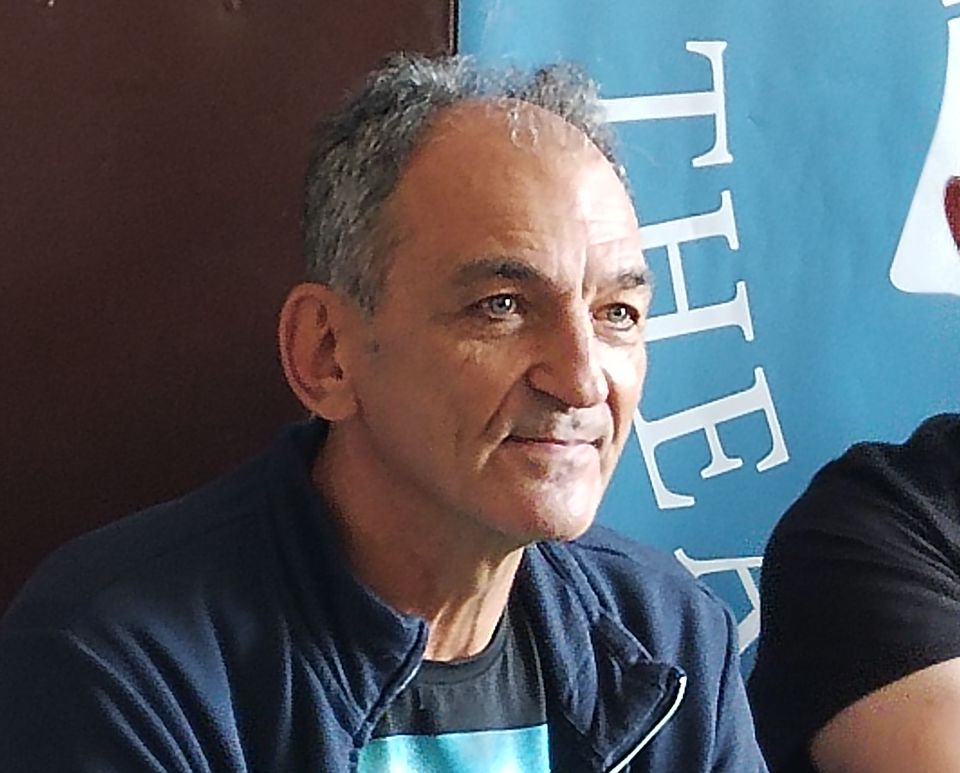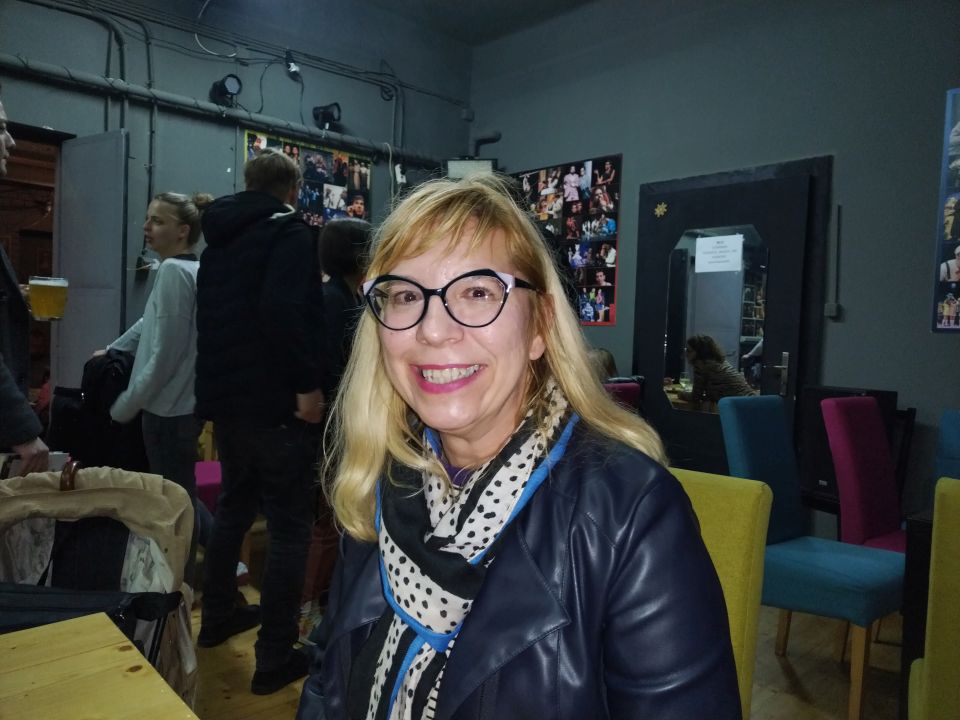Saša Latinović, a professor at the Academy of Arts in Novi Sad and an actor at the Youth Theater, is a member of the Festival Council. In between hanging out with guests from all over Europe and watching some great shows, he shared his thoughts on Novi Sad Theater Festival...
"Festivals give us the opportunity in a short period of time, in one place, to see what the new trends are and what the theater scene looks like - in our country or in the world, depending on whether the festival is local, regional or international. This festival of ours provided an opportunity for the audience, but also for us other creators, to see what new discoveries our colleagues who deal with a very similar theater genre - theater for young people and children, or puppet theater - have made.
In these 12 performances of the 2nd Novi Sad Theater Festival, we could see performances performed only by actors, producing all the effects with their body and voice, and with the help of live instruments. We could see performances in which the main characters are robotic toys-objects from everyday use, without seeing the actors at all, although they are there, because they control everything on the stage. We could also see two dance performances in which the text and speech are not dominant at all, but the body language is what tells the story. We had the opportunity to see guests from various parts of the world, which is wonderful and beautiful, because it gave our audience the opportunity to see something else that is not available in our theater. That moment of expanding the circle of knowledge and understanding of theater is one of the greatest values of the festival in general. It is wonderful that we were able to meet with our colleagues and talk, to exchange experiences: what kind of theater is there, what are their tendencies, what are the topics. We hope and look forward to the next "Novi Sad Theater Festival", that it will be richer and even more notable.
The festival, by the way, takes a long time to prepare. There are various services involved and people who deal with it and take care of everything, and there are also those who have to support us financially. We are under the authority of the Assembly of the City of Novi Sad and we are grateful for the support, because without it the festival could not be held. With this festival, we confirm that Novi Sad is a city of culture and that it deserves such a festival along with Sterija's Theater and Infant. Best of all, our audience is lucky and privileged to see it, and it is visited in great numbers."
The actress of the Youth Theater Slavica Vučetić is a member of the "Novi Sad Theater Festival" Council. Between the obligations she has with the Drama Studio during the festival, whose students participate in discussions with the creators after the performances, she talked about why it is important that Novi Sad has a festival like this...
"Novi Sad Theater Festival" is designed as a festival that is not limited to only one type of expression (puppetry, drama theater, musical, contemporary dance...), but as a festival that presents a wide range of creativity for the young and youngest audience to the local audience. This concept comes primarily from the desire to present our youngest fellow citizens with the most diverse forms of contemporary theatrical creativity for children and young people, performances that they do not have the opportunity to see in their immediate environment, to discuss them and build their own theater form preferences.
From the point of view of all of us who professionally deal with theater for children and young people, we are proud that already in its second year of existence, our festival has gained a notable place on the world festival map and that renowned theater creators respond to the invitation to participate in it. With a large number of friends and associates from the region, who, as our guests, follow the entire festival program, we raise professional standards in theater for children and young people and build a network of associates for new, even more challenging projects."
HIC SUNT DRACONES
Author: Pavel Stourac
Director: Pavel Stourac
Age recommended: 15+
City Theater "Žar ptica", Zagreb, Croatia
LITTLE FRIDA
Authors: Jelena Kovačić and Anica Tomić
Director: Anica Tomić
Age recommended: 7+
La Fille Du Laitier, Montréal, Québec, Canada
MACBETH MUET
Author: Marie-Hélène Bélanger and Jon Lachlan Stewart based on Macbeth
Director: Marie-Hélène Bélanger and Jon Lachlan Stewart
Age recommended: 14+
State Puppet Theatre Stara Zagora, Stara Zagora, Bulgaria
HOTEL
Author: Lyubomir Zhelev
Director: Lyubomir Zhelev
Age recommended: 7+
Zaches teatro, Firenze, Italy
LITTLE RED RIDING HOOD
Author: Luana Gramegna
Director: Alberto Bartolini
Age recommended: 5+
Tehatre Koper - Teatro Capodistria, Koper, Slovenia
THE DIARY OF ANNE FRANK
Author: Anne Frank
Director: Renata Vidič
Age recommended: 11+
Osijek Cultural Center, Osijek, Croatia
VELVET REVOLUTION
Author: Matej Sudarič, Vanja Jovanović
Director: Vanja Jovanović
Age recommended: 17+
I, SISYPHUS
Author: Veselka Kuncheva
Director: Veselka Kuncheva
Age recommended: 14+
Theatre “Boško Buha”, BeLgradE, Serbia
THE SECRET DIARY OF ADRIAN MOLE
Author: Sue Townsend
Director: Tanja Mandić Rigonat
Age recommended: 9+
Theater for Children and Youth Kragujevac, Kragujevac, Serbia
CITY OF LIGHT
Author: David Zuazola
Director: David Zuazola
Age recommended: 10+
Theatre “Atelier 313”, Sofia, Bulgaria
THE CLOWN AND HIS CHILDREN
Author: Ženi Pašova i Petar Pašov
Director: Ženi Pašova i Petar Pašov
Age recommended: 4+
The performance of Tel Aviv's Key Theater - "When all was green" is cleverly designed and - with attention to every detail - a meticulously executed theatrical play. It tells a story about nature and how man greedily stretches it, about green areas that are lost before the bestiality of concrete and human thoughtlessness, but also about one green bud of hope. After a show like this, the viewer can't help but ask himself, has it ever been completely green and will man ever become so conscientious that one day the color green prevails around us again?
We talked to Dikla Katz and Avi Zilha.
The play is inspired by Shel Silverstein's The Giving Tree. In our busy world today, what could that good tree be?
I think the tree and nature are a good metaphor in our lives. It is about existence, common coexistence, relationships of taking and giving, it is important to emphasize - not only taking. If we look at a tree, we have to appreciate what it gives us and respect it, and if we don't understand the importance of its survival, then we don't understand and don't respect the structure of the world.
Beauty is in small details, you really paid attention to them. It takes so much for a person to so gently and delicately move those little creatures that tell us this wise story through those dexterous fingers. Do today's kids, who are quite impatient, also see those details?
I think they see them, we try to make them pay attention to those details. We help them through our expression. The whole story could have been without details, sound, some movements, but thanks to those, the children see that it is not just a tree playing a tree but that the tree has a story to tell. Even if they don't connect everything at the beginning, if they don't fully understand, the story opens up for them in an hour, a day, a week.
Are you optimistic that someday in the future everything will be green again?
That is life's biggest question. The whole world will not become green, but we, humans have the power to make at least some small parts of this world greener, to think about our environment, parents, friends, other people, other countries, to be more sensitive and to realize that we are not the only ones in this world. Maybe the world won't go completely green again, but maybe it can get greener, step by step, if we're sensitive enough.
The Second International Festival of Professional Theaters for Children and Youth Novi Sad Theater Festival has been a safe haven for our children and young people and their parents in the past seven days. We express our gratitude to all the ensembles who arrived in Novi Sad and showed us the best of what they can do. And now the awards, which were decided by a jury consisting of a costume designer Milica Grbić Komazec, a journalist Olivera Milošević and an actress Maja Lučič.
DECISIONS OF THE JURY
- Grand Prix - award for the best play as a whole is awarded by the jury to the performance "Ronia, The Robber’s Daughter", directed by Jakub Maksimov, Theater for Children and Youth, Skopje.
The performance is exceptional and layered in all segments, at the same time archaic and modern, and has all the components that make it outstanding.
- Best Director Award is awarded to Tamara Kučinović for the play "Frozen Songs" of the City Puppet Theater Rijeka.
Extremely precise and skilful, Tamara Kučinović connected all segments of the play and created a realistic, but at the same time warm and imaginative theatrical story.
- Best Actor/Actress Award - Jelena Trkulja for multiple roles in the play "Heidi", directed by Đurđa Tešić, “Boško Buha" Theatre.
Jelena Trkulja interpreted three different characters in the play, which is characterized above all by collective play. Her acting was utterly believable, witty and suggestive.
- Animation Mastery Award - Matea Jankovoska for the role of Ronia in the play "Ronia – The Robber’s Daughter", directed by Jakub Maksimov, Theater for children and young people - Skopje.
Matea Jankovska skillfully animates the puppets, energetically and heartily playing a brave and daring girl, using a wide range of animating and acting skills.
- Special Award for Authenticity and Originality - the play "Clowns’ Houses", theater "Merlin" from Berlin, authors Dimitris Stamu and Demetra Papada.
The award is given for authenticity and originality, for showing modernity through a specific visual and dramaturgical expression in a play that through dark humor and grotesque tells a story about us today.
- Special Award for Overall Impression is awarded by the jury to Alek Ćurčić, for the performance of the play "Geometry of the Soul", directed by Olga Zečeva, from the "Plus" theater from Spain. The award is given for the overall and stunning impression when using various performing arts techniques in the play "Geometry of the Soul", which is a good example of contemporary theatrical expression.
- Special Award for Collective Acting and Animation to the ensemble of the play "Frozen Songs" directed by Tamara Kučinović, City Puppet Theater Rijeka.
The ensemble of the play showed exceptional skill in expressing subtle emotions through puppets, insisting on the precision of synchronized, realistic movement expression.
Maja Lučić, president of the jury
Olivera Milošević, member of the jury
Milica Grbić Komazec, member of the jury
Actress Neda Danilović, who also runs the Children's Drama Studio at the Youth Theater, is a member of the "Novi Sad Theater Festival" Council. She spoke about all the good features of this festival between performances and conversations between young audience and the performance creators...
"Members of the festival council watched quite a few of the 70 or so plays and recommended their selection to the festival director who made the final decision, adding to our recommendation a few more plays that we thought were important for our audience to see. We have the opportunity to see both artistic and an age cross-section of topics and genres, and the full halls say that the audience really liked the idea of being able to meet and communicate with such variety of performers in just one week. As very significant, I would single out as many as four plays intended for teenagers, an apparently neglected target group, too old for fairy tales, and too immature for adult themes. Regular meetings of the young audience and artists enabled direct exchange, sometimes even discussions, about the topics dealt with by today's theater for children and young people. The crucial message of us adults through that communication is our undoubtful commitment to never give up on their interests. With this, I hope that everyone understands the determination of the Youth Theater to announce the quality of future performances that it owes to the audience for which it was founded. The variety of inter-artistic gatherings within the festival is a significant incentive for the further development of the festival and in terms of workshop research that would allow artists the benefit of acquiring new skills.”
Demetra Papada is part of the Greek troupe "Merlin", based in Berlin, which performed "Clowns’ Houses" at the festival. Greek-German artists portrayed the world of alienated people in an authentically black-humored and grotesque, but also poignantly humorous way...
As an artist, are you afraid of the world you talk about in the play?
I am, of course I am, like everyone else, but the theater is a way to talk about those fears openly in order to overcome them. To analyze and share the experience of thinking and the experience of fear, that is important in the theater. We put a lot of personal stuff in there, but it is the story of all of us, both politically and socially in the whole world. All our plays talk about current problems, and we address children and their parents.
What kind of stories are good to tell our children and how should they be told in the theater?
For me personally, it is important that stories for children are true. I make them the same way as for adults. My opinion is that if I like something as an adult and I'm not bored, kids won't be bored either. I treat children as friends. I try to make my theatrical language clear and precise, true. If it is true and acceptable, then I can talk about difficult things, but also dream about a better time. We can all create resistance and solidarity together. In that sense, I am both a realist and a dreamer. This is how you should talk to children.
You are a Greek troupe with an address in Berlin. Is it possible to function as an independent troupe?
It is. We are a completely independent company that does nothing for fun. Everything that we showed in this play, for example, we made from waste, recycled things, which is a way to contribute to a cleaner world. In this way, we can connect ecologically with people's consciousness.
Are you supported by the German government in any way?
We are a completely independent company, but during Covid period, the German government helped all our artists and that was really important, while in Greece, for example, no one helped the artists, which makes my heart ache.
What other plays do you perform?
Recently, we are performing two plays, one for the whole family - "No Man's Land", and the other play called "Drowning" talks about the anxieties of our world and how to deal with them. It also talks about how to live without striking a pose, because people today live a lot in a pose - untrue. And it would be simple just to live, and be...
We found the team of the play "When all was green" from Tel Aviv, Israel in front of the Youth Theater, in the company of the president of the Jewish Municipality of Novi Sad - Mirko Štark and the Festival producers Ivana Todorović, Lola Živanov and Sava Stefanović. Despite the fact that there is a very dramatic situation in their country at the moment - missiles are being fired over people's heads and at them, Israeli artists managed to arrive in Novi Sad. Here, they say, they are embraced by warm hands of their hosts...
The world is becoming a cruel place for everyone, and these days the capital of Serbia was the scene of a terrible tragedy that should never have happened. With the Bulgarian artist Biserka Kolevska, who directed the play "Through the Looking Glass", and who took the children on an extremely exciting journey, the conversation began with the question about the importance of telling stories - and which ones...
What kind of stories are we obliged to tell our children?
We must tell children good stories, about good people, tell them good examples from life. We have to tell them about the importance of companionship and having a good friend. And stories about having to believe in themselves. Alice believed in herself and that's why she could go on. "Alice" and stories like it are not only for children, but also for adults. "Alice" is a story with many meanings and many important life sentences. Today in the world you have to run a lot and fast to get to your place, the place that belongs to you. If you don't run, if you don't keep moving forward, you sleep, young people move on, and you sleep at home and nothing will become of you. In our performance, we tried to explain why it is important to think, and we tried to achieve that through visual effects.
What do we adults hide behind the mirror that we shouldn't?
We are afraid to look in the mirror, and it would be good if we were not ashamed to see ourselves in it, because that is the only way we can correct our mistakes. "Alice" is the only natural one and as such she is very visible among all those creatures who are ugly, stupid, evil, useless... Alice is that hope, the canvas on which our imperfection is projected.
Does this human civilization of ours have the strength and will to change that, can arts and culture, for example, do it?
I am very sorry that it is so, but I do not believe it. All of us who work in the theater try to point out that money and power are not important and deciding factors. I'm very sorry, but I'm afraid people have gone completely crazy. Unfortunately, the children have already gone crazy. Currently, I'm staging the play "Peter Pan" and at one point in the play a sentence is heard: If you don't believe that fairies exist, they will disappear, and there will be death. My actors and collaborators are trying to convince the children to believe in magic.
Magdalena Lupi Alvir is a playwright and director of the Rijeka City Puppet Theater who brought to Novi Sad Theater Festival the tender and warm "Frozen Songs". It is a performance that we needed, not only in this moment of our social-political situation and ways of dealing with children or not, but in general the kind of performance that should be created for our youngest at all times. It talks about the fact that a smile comes to your face even if you think it will never be on your face again, and you only need to have someone next to you who feels and understands your being...
We live in a part of the world where there are no such great colds as in "Frozen Songs", but because of everything that is happening, both in this part of the world and worldwide, we can say that the mistakes of humanity are beginning to chain us. What songs would have to be sung now to thaw the frozen heart of an alienated world?
The initial title of Tamara Kučinović's play was "Frozen songs for warm hearts". Warm hearts are a terribly important place for us. It is the only place that is safe, which is our home and it should always be open to everything that the outside world tries to cool. We definitely need to talk about these topics with children, because we live in a world that is quite ruthless, more and more merciless, less and less communicative and more and more cold; to talk about true emotion, true friendship and love, about the fact that you always have room in your heart for others and for those who are different from you. The girl in our play comes "from Europe" to a region that is an imaginary part of the Russian northern regions, which the director Tamara took from the original author, the Russian writer Stepan Pisakhov. We must constantly keep in mind that those warm hearts are always open to all people who need warmth, and everyone needs it. We have to constantly try in any way to thaw that world that persistently freezes us for various reasons and find a moment and a sincere emotion, and children know how to recognize that. That is why we must speak honestly, truthfully and openly with our children, and that is the only space that we must be aware of and invite adults and parents to enter. Children have it innately, they know how to recognize it, and we adults often forget it and often build this dull, frozen world around them, which is terrible for an adult to admit. We adults must therefore be aware that we must open our hearts.
Why do we push children to be more grown up than they are?
That's exactly what we're doing. Constantly skipping over them, we accelerate and measure them according to some of our own, wrong standards. And as much as we think that everything else is not letting them grow undisturbed at their own pace, we are actually the ones who are not letting them grow up, with both good and bad things, to simply live a life appropriate to their age. We do it out of some fear for them, and we are afraid because we ourselves have too many fears, some inherited, some from the past, some from the present, and some from the future, because we constantly project fear from some future. We are doing wrong to ourselves as parents, and also to our children. You just need to let them go, which, I know, is easy to say, because it's not easy from a parent's position. Practically, you should let them go and only be their support and help, and try to direct and channel everything that bothers and interests them, talk, channel both your own and their fears. And it comes to some solution, which in the end may not even exist, but at least ask the right question at the right time. And be their support in growing up. It is involuntarily absent, and it is not our intention to do so, however, the culture of growing up at any cost, by any measure, pushes us towards it. And the world is accelerated enough without that and they should not be pushed into even greater acceleration because we have all become victims of that acceleration. It is important to let children grow up at their own pace.
The performance "Geometry of the soul" was a magical journey through the thoughts of a young artist, magical and sublime, completely gentle, at once witty, completely poetic, above all healing and finally cathartic. We attended a real artistic act, unpretentious, but significant in the European framework. It was a thrilling measurement of the immeasurable and a true taming of the untamed. An epiphany that was greeted with a standing ovation.
The performer and author of the idea for this play, Alek Ćurčić, who was educated in Bulgaria, where he studied puppetry, while today he lives and creates in Gijon, Spain, was the absolute star of the evening among the audience.
What kind of mental preparation is required for this performance? We heard during the conversation with the participants of the Drama Studio that it takes seven hours to set it up. It takes so long to arrange all its elements, and does it need another seven hours to get it right in the head?
It's not easy. It is a rare occasion when we can have a day before in some theater to set everything up. Apart from physical time, I need to prepare mentally. With time I learned to adjust so it gets easier. In performances like this one, you can clearly see when you are not prepared. Something small is enough to go wrong and it's not the feeling that the audience should actually have. If you are tired, ok, you perform, but you are not completely there. If you don't have time to rest before the performance, to arrange your thoughts, you push yourself, you force yourself to do everything you need to do, but in the end it doesn't go very well. People may enjoy it, because they don't know the true potential of the play, but I do, and that's why it's important to calm down fifteen minutes before the performance, to be calm.
You measured the soul with objects on stage. And man has a soul, which, admittedly, he loses more and more. Is there anything that could prevent, or at least slow down the process?
Yes, we are losing our soul. And that is one of the reasons why "Geometry of the Soul" was created and how it was created. I noticed that people don't think about details, about small, tiny things, movements... People do something big and visible, but they don't pay attention to what else is there. They just don’t connect in any segment with the little things and I wanted to focus on them. I wanted little things on stage to have meaning and for the audience to see and feel that in every movement. In collaboration with those little things I set in motion on the stage I tried to find the soul of the audience, feel it and tame it.
When did you realize, at what stage of rehearsals, what age audience is this play for?
We haven't figured it out yet. That range is quite wide, it seems to me. We put it as eight to nine years old, but once we were at a festival back in Spain where it is a tradition to bring very young children to the performances, so we had children as young as two or three years old at one performance. They watched it with interest, they were calm and attentive, however, I think it would be good that "Geometry of the Soul" is watched by those who have an idea of what geometry is.
The actors of the Berlin show "Clowns’ Houses" had bad luck when arriving in Novi Sad, because their luggage, which contained scenography and puppets, was lost on the flight to Belgrade. Because of this, the performance of their play was called into question. Fortunately, the luggage was traced... It turned out that the puppets, on their way through Europe, wanted to have a little fun in Vienna. They appeared tonight, May 14, around midnight, at Nikola Tesla Airport. We were all happy, and the two-member team of the "Merlin" Theater, which includes Dimitris Stamu and Demi Papada, could breathe a sigh of relief, because we will see them on May 15 from 2 p.m. We are waiting for you...




